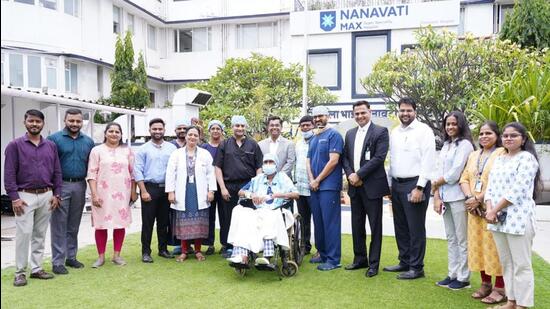

Siddheshwar Dake, a 42-year-old resident of rural Beed in Maharashtra’s drought-prone Marathwada region, had been battling worsening abdominal pain and gastrointestinal issues for over two years. Despite visiting several hospitals, he received no definitive diagnosis—only speculation ranging from ulcers to suspected cancer.
Critical Diagnosis at Mumbai Hospital
In January, Dake was referred to the liver, intestine, and pancreas outpatient department at Nanavati Max Hospital in Mumbai. By February, a detailed evaluation revealed he was suffering from Superior Mesenteric Artery (SMA) thrombosis—a life-threatening condition in which a blood clot blocks the artery supplying the small intestine. This had caused gangrene due to lost blood flow.
Dr. Gaurav Chaubal, Director of HPB Surgery and Multi-Organ Transplant at Nanavati Max Hospital, said: “He was in a hypercoagulable state, meaning his body formed clots more easily. We had to act fast to remove the dead tissue. But ultimately, he needed a small intestine transplant to survive.”
No Living Donor Available, Cadaveric Transplant Becomes the Only Option
With no suitable living donor in the family, doctors placed Dake on the national cadaveric transplant registry in April. A month later, the National Organ and Tissue Transplant Organisation (NOTTO) alerted the hospital about a matching donor in Delhi—a 21-year-old woman declared brain-dead after a road accident. Her family’s decision to donate her organs paved the way for the transplant.
Rapid Organ Retrieval Across 1,400 km
A specialized team from Nanavati flew to Delhi to coordinate the organ retrieval and worked closely with Max Healthcare’s hospitals at Shalimar Bagh and BLK-Max. After harvesting the organ, authorities activated emergency ‘green corridors’ in both Delhi and Mumbai.
“The intestine was escorted to the Delhi airport by police and flown to Mumbai on a chartered medical flight. Thanks to pre-cleared traffic routes, we transported it to Nanavati Max Hospital in under 10 minutes after landing,” said Dr. Aditya J. Nanavati, Associate Director of HPB Surgery and Transplant.
He added, “Every minute counts—small intestines can only survive for a limited time outside the body.”
Eight-Hour Surgery and Swift Recovery
The Hindustan Times reported that the transplant surgery lasted eight hours, and the medical team completed it within the required ischemic time. They then placed Dake in a dedicated transplant ICU, where he received immunosuppressive therapy, strict infection control, and nutritional support. The doctors discharged him within three weeks, and he continues to show good recovery under follow-up care.
One of the Rarest Transplants in India
“This is one of the rarest solid organ transplants performed in India,” noted Dr. Vivek Talaulikar, COO (Western Region), Max Healthcare. “It highlights not only the expertise of the medical team but also the critical role of national coordination in saving lives.”
A NOTTO official confirmed that small intestine transplants remain extremely rare in India due to their complexity, both during surgery and in post-operative care.
This case underscores the life-saving potential of organ donation, interstate collaboration, and advanced medical care—all coming together to give a new lease on life to a patient who had run out of options.























